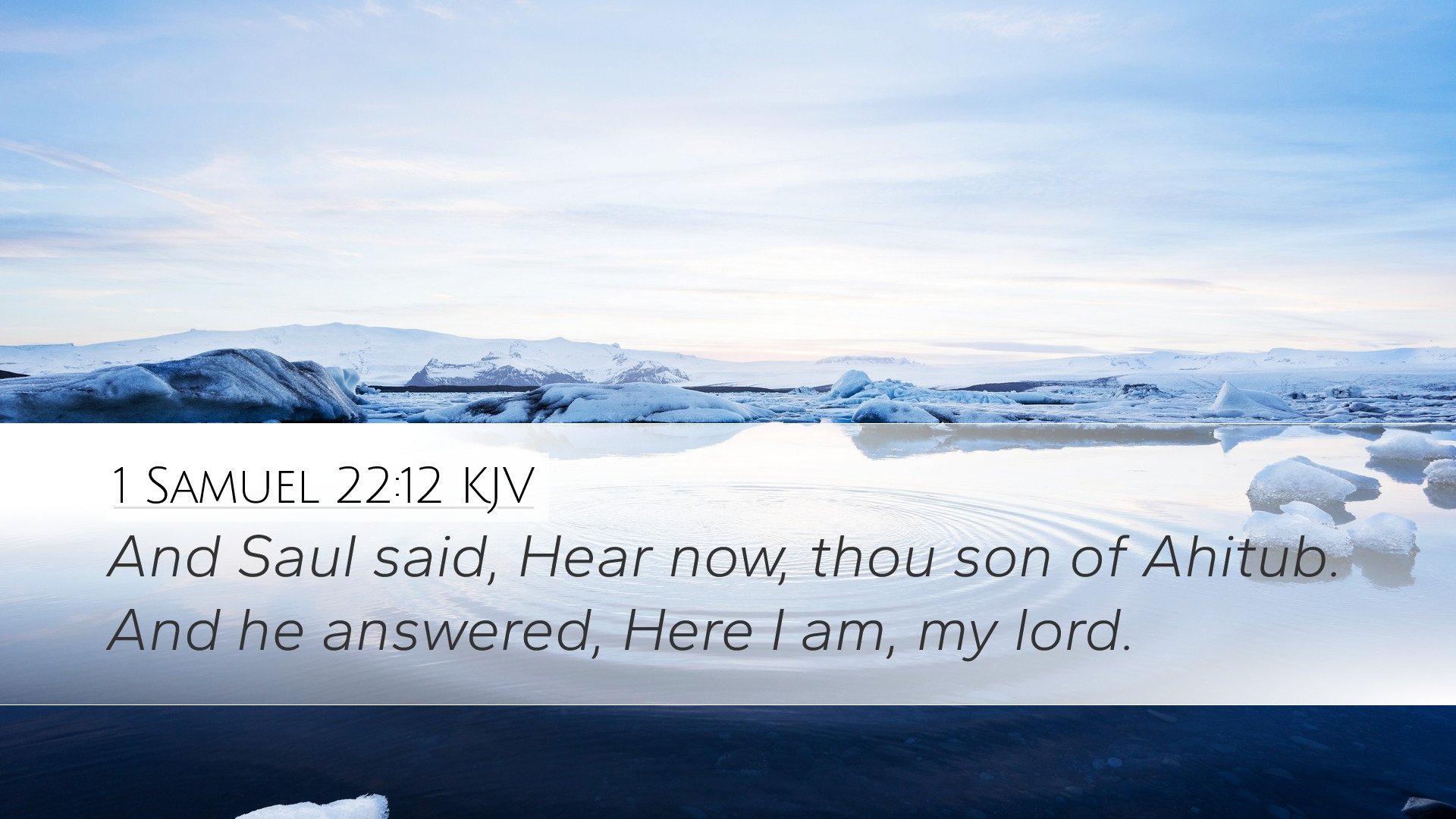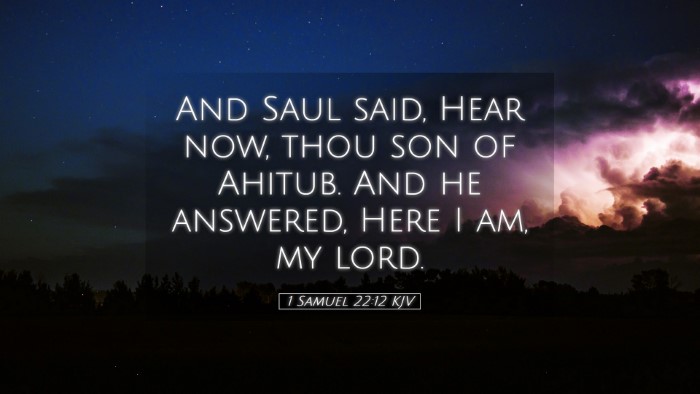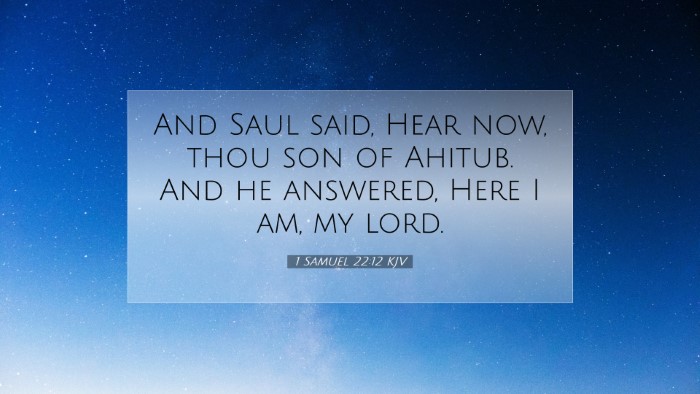Commentary on 1 Samuel 22:12
Verse Context: 1 Samuel 22:12 states, "And Saul said, ‘Hear now, son of Ahitub!’ And he answered, ‘Here I am, my lord.’" This verse marks a vital moment in the narrative of King Saul and serves to illustrate his character, particularly in connection with his treatment of the priests and his growing paranoia.
Introduction
This commentary explores the significance of 1 Samuel 22:12, including its contextual background, the implications for the priesthood, and the personal dynamics between Saul and those of the priestly lineage. Throughout public domain commentaries, such as those by Matthew Henry, Albert Barnes, and Adam Clarke, we find a wealth of insights that can deepen our understanding of this passage.
Commentary Insights
1. Historical Context
The historical backdrop of this verse is crucial for understanding Saul's actions. At this point in the narrative, Saul is increasingly consumed by jealousy and fear of David, whom he views as a rival for the throne. His apprehension leads to a brutal purge of the priests and anyone associated with David.
2. Themes of Authority and Loyalty
Saul’s Demand for Loyalty: Saul’s calling out to Ahimelech, the priest, emphasizes his authority and the expectation of loyalty. This moment signifies a turning point where loyalty is vital, and those in positions of power expect absolute submission and allegiance. The acknowledgment of "Here I am, my lord" reflects the hierarchical nature of their relationship. However, it also foreshadows the tragic consequences of blind loyalty in the face of a morally compromised authority.
3. The Role of Ahimelech
Ahimelech's Service: Ahimelech’s readiness to respond to Saul indicates his respect for the king’s position. Matthew Henry observes that Ahimelech likely anticipated a request or inquiry about army provisions, perhaps demonstrating his commitment to serving all of Israel. This portrayal of Ahimelech embodies the ideal of priestly service, yet simultaneously highlights the precarious situation in which he finds himself.
4. Divine Authority versus Earthly Authority
Albert Barnes offers insight into the tension between divine authority and earthly governance illustrated in this encounter. Whereas Saul's authority is derived from his kingship over Israel, the priests’ authority comes from their divine appointment. Ahimelech's submission juxtaposes God’s ultimate sovereignty against Saul’s diminishing moral compass, signifying a fundamental conflict that will come to a head in the following verses.
5. Theological Implications
Faith’s Response to Authority: This interaction invites theologians and scholars to consider how individuals in positions of faith respond to earthly authorities that may demand actions contrary to their spiritual convictions. Adam Clarke uses this verse to challenge readers to reflect on the equilibrium between civil obedience and divine loyalty, emphasizing that God’s calling takes precedence over human authority.
6. The Downward Spiral of Saul's Leadership
Saul’s interaction with Ahimelech highlights his deteriorating leadership. Starting from a place of divine selection and favor, Saul has progressively turned away from God, as seen in his willing targeting of priests. Matthew Henry notes that this moment illustrates Saul's instability and indignation, presenting a leader who has lost sight of his responsibilities not only to God but also to his people.
7. Most Notable Moments
- Soul’s Authority Questioned: Saul’s question, "Hear now, son of Ahitub!" subtly implies an interrogation about allegiance, with an undercurrent of suspicion towards Ahimelech's loyalty to David.
- Reflection on the Leadership model: Ahimelech's response reflects the ideal submissiveness expected from a priest, exemplifying the contrast between the subsequent actions of Saul and David.
- The Impact on the Priesthood: Saul’s call to Ahimelech brings forth a tragic reality for the priests, showcasing the dangers within the political realm where personal vendettas lead to moral crises.
Conclusion
1 Samuel 22:12 encapsulates themes of authority, loyalty, and the ramifications of diverging from divine principles—a poignant lesson for all who claim leadership, especially within the church. As scholars and leaders reflect on Saul's tragic downfall, there is a compelling call to internal examination regarding the relationship between faith and authority. From Ahimelech’s faithful service to Saul’s troubled reign, this passage challenges readers to navigate their responses to authority while remaining steadfast in their fidelity to God.
Reflection and Application
Ultimately, 1 Samuel 22:12 is not merely a historical account but serves as a living text urging contemporary believers to uphold integrity in leadership, to discern the voice of authority accurately, and to navigate the complexities of loyalty with wisdom. The observations elucidated by Matthew Henry, Albert Barnes, and Adam Clarke offer rich avenues for personal reflection and communal discussion, reminding us that every response to authority can have profound implications.


